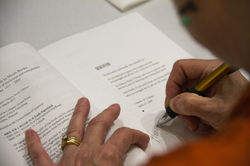
FROM MELON FIELDS TO
MOON ROCKS
Dianna Borsi O'Brien published the autobiography of mid-Missouri chemist, Charles Gehrke, who helped NASA test for life on the moon.
 |  |  |
|---|
Photos by Rachel Thomas
Could you imagine being tasked with writing a stranger's life story? That's exactly what Dianna Borsi O'Brien, freelance journalist, was asked to do. She recently released her book "From Melon Fields to Moon Rocks" an autobiography of Charles Gehrke. Gehrke was an important character within the field of chemistry as a whole, and he brought economic benefits to Columbia, Missouri and mid-Missouri families. So, why is Gehrke's story important? I met with O'Brien to ask her. We may not all be scientists or have founded our own laboratories. What's most memorable, and what I think we can all relate to was his complex combination of human qualities. He was ambitious, impatient, proud but also a kind and compassionate father. He became successful, but he was flawed. He wasn't adored by all those around him, and he knew it.
In 2007, O'Brien was called by Gehrke's son John. He asked her to write a book with his father because he "analyzed moon rocks and was a famous scientist," O'Brien said. She needed to be convinced that he wasn't just another scientist. And she refused to write a rainbows-and-unicorns fluff story that would paint Gehrke as a flawless human being. John was right, Gerhke had worked with NASA to test moon rocks for life by detecting amino acids. That in of itself was impressive, but what O'Brien found more impressive was his contribution to Columbia. Gehrke founded ABC Labs, a huge beneficiary to the city's economy and job provider for hundreds of local residents. He was not only a scientist, but also an entrepreneur.
"I remember a lot of famous people, and they didn't have a good family. This is a son, calling about his father. This man is also a family man. He was a family man who was an entrepreneur who was a scientist," she said.
After getting to know Gehrke and more of his story, he agreed to let her write the truth about what happened, no fluff and no bias.
At the time John reached out to O'Brien, Gehrke was working on a project proposal with NASA to place a laboratory on Mars, a five year project. At 89 years old, he was determined to be the principle investigator on the project. Gehrke was ambitious up until the day he died.
Two years later in 2009, O'Brien was a few years into researching and fact checking Gehrke's stories, meeting with his relatives, past colleagues and students to piece together a truthful narrative of his life. O'Brien was notified that Gehrke was in palliative care and likely to pass away soon. She went to visit him and asked how he was doing. He immediately asked, "Where's your notebook? We have work to do." He passed away the next day.
After his passing, the family granted O'Brien access to all of his documents in his basement, everything from meeting agendas and personal notes. She spend the next eight years going through documents, meeting with more and more sources, even digging through his archives at the University of Missouri. She discovered the more negative side of his personality, his messy relationships and ambitious nature. I won't spoil the story of his life in this post, but the book presents Gehrke as far from a perfect man, but nevertheless a good one.
You can find more information about the book and O'Brien's experience writing it at her website: https://diannaobrien.com/.



